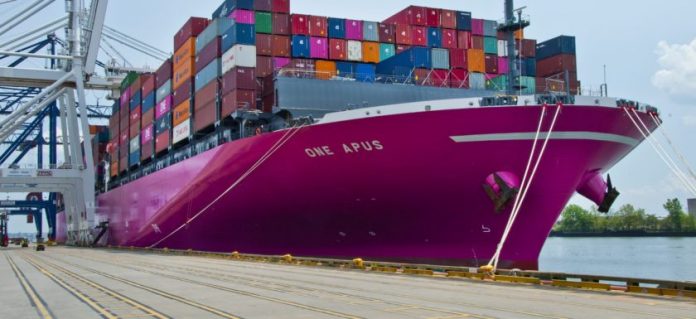Low US productivity compared to Asia where factories and logistics companies, including ports, work 24 hours a day compared to their counterparts in the US is causing the backlog of cargo in Southern California.
[s2If is_user_logged_in()]Speaking at this year’s virtual Transpacific Maritime Conference, traditionally held in Long Beach, Ocean Network Express (ONE) CEO Jeremy Nixon told listeners that dockers in the US do not work weekends, they work only 112 hours a week on the berth and just 88 hours a week on the terminal, with warehouses only working during daylight hours.
“Asia is in full production, but we are unable to sustain this in the US due to work practices, production in Asia is 50% higher than in the US,” said Nixon.
While Asian factories are working 24 hours a day in the US they are not, which was not a problem in the first half of 2020 as demand collapsed with vessels arriving on the US West Coast just 10% full.
“We were preparing for the worst, we were all caught out,” by the very strong “V-shaped” recovery, it was “extraordinary”, said Nixon, “We all struggled to get capacity back in”. Meanwhile, in both Europe and the US there was an increase in infections with a spike in demand that coincided with a lack of staff, by November/December there was a marked increase in dwell times.
Average cargo handling times in port increased from 4.5 days to 7.4 days, since December “Some vessels are alongside [at the berth] for 11 days,” explained Nixon, there were no more ships to charter with 150 extra loaders in the second half of 2020. With the delays in the US it meant schedules were sliding, ships were not returning to Asia, because they were waiting at anchorage outside of Los Angeles and Long Beach, “Today there are 41 ships in the bottleneck,” he said.
That meant “We were running out of ships in Asia,” moreover those ships would ordinarily return with 30% of their load comprising of empty containers ready for more exports from Asia.
According to Nixon, by the end of the first half of this year inventories in both Europe and the US will have been restocked and demand will slow, allowing the logistics system to rebalance, and to get ships back on schedule, during the second half of the year.
AP Moller Maersk CEO ocean and logistics Vincent Clerc, who appeared after Nixon at the virtual TPM event, believes that the entire logistics industry needs to collaborate to respond better to major disruptive events such as the pandemic, the financial crisis and others.
“Global supply chains are complex,” said Clerc, “There is a growing need to diversify the supply chains because they are too lean and vulnerable, as shown by the 2020 experience.”
Maersk sees the optimisation of supply chains has meant a lack of flexibility, but by collaborating with customers then lines and shippers can successfully navigate these major events.
Clerc gave an example of an electronics customer that shipped goods from a factory in Latin America to the US, but their factory was shut down due to effects of Covid-19. By working together the solution was found, shipping goods from Asia to Europe and then on to the US said Clerc.
For AP Moller Maersk the three pillars of future supply chains are digitalisation, integrated solutions and sustainability, while shipping is “behind the curve” as far as digitalisation is concerned the pandemic and consumer platforms had changed consumer behaviour.
Clerc believes that digitalisation will allow standardisation of data with a more granular access to information will allow the industry to move forward. That allows for integrated solutions which “hold the key to further untapped solutions,” added Clerc.
Moreover, climate change, like the pandemic, is a global challenge that requires a global solution, as an industry shipping has an obligation to reduce its greenhouse gas emissions.
Maersk believes that there will be further disruptions to the supply chains and to deal with these challenges all of the stakeholders in the supply chain must show the ambition to change logistics from “the art of problem solving to the science of opportunity seeking and anticipation for the benefit of customers.”
According to Clerc, Maersk wants to focus on a customer led view of how logistics can be changed for the better. The idea of integrated supply chains is to simplify them, giving lower costs, more resilience and more flexibility. “That is the big opportunity here that we want to capture,” he noted.
There is not enough capacity in the world today to meet the spike in demand, said Clerc, but the way that you set up your supply chains can help you deal with these major events in a more resilient way, “The current crunch is not affecting all customers in the same way, that depends on their supply chain set up,” he added.
In order to develop these strategies, Clerc is urging customers to approach this years contract negotiations “as a business negotiation” rather than a contract negotiation. Contract negotiations need to draw learning from the past and see how the industry can work together to find solutions. “A transactional price-based discussion alone is never a good idea, but especially this year it will not lead to the outcomes we want,” said Clerc.
The AP Moller Maersk CEO says that contract negotiations have shifted to two-way commitments and within five years close to 100% of contract discussions will be on this basis, because they are “value propositions that are compelling to many”.
[/s2If]
[s2If !is_user_logged_in()]Please login or register to read the rest of the story[/s2If]
Nick Savvides
Managing Editor







